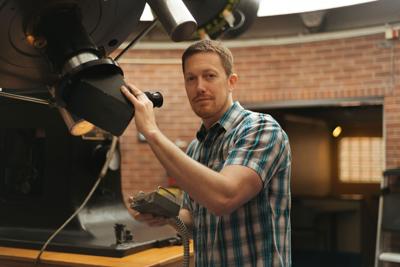
Billy Teets
When Billy Teets tells people he’s an astronomer, there are a few common questions that come up.
Does he believe in aliens?
“I do believe in aliens,” he says. But there’s a caveat. “When I say ‘alien,’ do I mean a little creature in a spaceship? No, not necessarily. I mean life outside of our solar system. When you look at all the planets we’ve found, we know we’re not the only planet in the universe. There’s going to be other planets like Earth out there, and I think there’s definitely a good chance there’s going to be life elsewhere.”
Would he like to go to space?
“Yes, for a day,” Teets says. “I want to see things from above and then come back. I wouldn’t want to spend a year in space.”
What’s the coolest thing he has seen?
It’s all cool when put into perspective — something that Teets helps people do as director of Vanderbilt Dyer Observatory.
“Even when you can barely see something in a telescope, it’s still really incredible,” Teets says. “Especially when you think about what you’re seeing and how far away it is, how big it is, how long ago you’re seeing it, because it takes time to get to us.”
When Teets hosts school field trips at the observatory, the conversation often quickly turns to black holes. Teets, with his methodical and patient nature, welcomes it. He wants people of all ages to be able to ask their own questions about space during their time at the observatory.
Dyer Observatory, high atop a hill near Radnor Lake, is celebrating its 70th year. It’s a quiet and peaceful space, perfect for reflecting on the mysteries of life, or life beyond Earth. The location is also necessary to be able to see things in the dark sky, away from city light pollution.
Teets began working at the observatory in 2006 as a graduate student. He’s been interested in outer space since childhood, and began amateur astronomy in high school, looking through his telescope at the night sky over Clarksville. When it came time to choose an area of study, he considered engineering, but ultimately decided on a physics major and went on to graduate from Vanderbilt’s competitive physics Ph.D. program with a focus on astronomy. He likes to work with his hands, and he got to flex that skill in 2017 while restoring the now 70-year-old reflecting telescope, the largest and most powerful in the observatory. He also made an impressive interactive 3D model of the many visible stars from Earth, among a number of other projects throughout the building.
With its small staff (four including Teets), the observatory hopes to reach more people in 2023. The organization attracts visitors with its summer camps, Bluebird on the Mountain summer concerts, Opera on the Mountain performances and its most popular event, monthly telescope nights. Something Teets and the staff pride themselves on is having brains available for picking, as well as hands-on experiences (ever held a meteorite?). The observatory offers monthly open houses, Q&A sessions with scientists and astronomers, and daytime guided tours.
“You can ask some astronomers, and especially very well-known astronomers, ‘Do we know how stars form?’ and they’ll say, ‘A little bit,’” he says. “We keep making bigger and better telescopes, and [astronomers] keep observing a lot of the same objects. We’re getting more and more of these observations to figure out some of these very fine details that help bring this giant puzzle all together.”
When Teets was in elementary school, scientists only knew of planets in our own solar system. He can tell students today about more than 5,000 planets found orbiting other stars. He estimates that by the time these students are his age, tens of thousands of planets will have been discovered.
“It would be fun to be able to go back in time,” he says. “Galileo saw Jupiter with his telescope, and it looked like a small ball. I’d love to see his face to show him a picture of Jupiter from orbit. That was just 400 years ago, so to go another 400 years, it’s going to be astonishing to think about what we might have by then.”
Photographed by Angelina Castillo at Vanderbilt Dyer Observatory
Profiling some of Nashville’s most interesting people, from drag legend Tina Louise to TSU’s Flutebae and more






